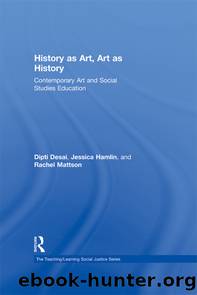History As Art, Art As History by Desai Dipti;Hamlin Jessica;Mattson Rachel; & Jessica Hamlin & Rachel Mattson

Author:Desai, Dipti;Hamlin, Jessica;Mattson, Rachel; & Jessica Hamlin & Rachel Mattson
Language: eng
Format: epub
Tags: Education
Publisher: Taylor & Francis Group
Published: 2009-09-25T00:00:00+00:00
Employing a brightly colored palette to his satirical acrylic paintings, Ben Sakoguchi comments on a range of injustices that frame American society including social and political issues and historic events. Drawing on images, texts, and objects from popular culture, Sakoguchiâs images provoke the viewer to question conventional beliefs about modern warfare, citizenship, consumerism, and the media. More broadly, Sakoguchiâs source material (LIFE magazine, movie stills, postcards, and newspapers) suggests that what we learn about events in the United States and around the world is inexorably linked to how we learn about it.
Sakoguchiâs series Postcards from Camp (1999â2000) is a visual record of daily life in the internment camps that housed Japanese-Americans during World War II. Based on his own experience as a Japanese-American and his early childhood memory in the Poston internment camp in Arizona, each of the eighty picture postcards explores the tensions and contradictions between personal and public memory of this time, as well as the contradictions between propaganda and reality.
Sakoguchi began to work on this series in 1994 when he realized that his father was dying, and continued to work on it after his fatherâs death in 1996. In discussing the project with his mother, he was taken aback when she declared that she had hated every moment of living in the camps, a time that he remembered her as accepting stoically, if not without issue. This disjunction between his memory of this time and her eventual revelations spurred Sakoguchiâs interest in re-presenting the historical events of Japanese incarceration from a new vantage point. In this series Sakoguchi draws on primary source materials such as family photographs, documentary images of other internees, texts from media sources, and quotations from collections of Japanese-American internees and government agencies during that time period. The series is grouped into several sections: the prewar Japanese-American community, the evacuation, camp, the achievements of Nisei soldiers during WWII, postwar resettlement, and Asian-American victims of hate crimes in contemporary America.
In the work âRohwer, Arkansasâ (Plate 5), Sakoguchi portrays young Japanese-American boys playing marbles on a sunny day outside their barracks at the Rohwer Camp. It is a picture perfect moment that is often found on postcards in tourist stores. A postal stamp on the postcard indicates the time, place, and date this card was sent to us, the viewers, but also indicates that we are looking at a scene from that time. Below the image of the children is a quote from John J. McCloy, Assistant Secretary of War in 1942, that states: âIf it is a question of the safety of the country (and) the constitution ⦠why the constitution is just a scrap of paper to me.â We are left to wonder where the connections are between this placid image and the distrustful, nervous quote below it. The statement by McCloy suggests that the country is not safe, and that in times of insecurity, drastic measures are required. McCloy refers to the Constitution as a scrap of paper â fragile, malleable, indefensible. His quote hints at the justifications for how the U.
Download
This site does not store any files on its server. We only index and link to content provided by other sites. Please contact the content providers to delete copyright contents if any and email us, we'll remove relevant links or contents immediately.
Technical Art History by Jehane Ragai(232)
The Slavic Myths by Noah Charney(190)
Drawing Landscapes by Barrington Barber(176)
Simply Artificial Intelligence by Dorling Kindersley(166)
Drawing for the Soul by Zoë Ingram(160)
The Art of Painting Sea Life in Watercolor by Maury Aaseng Hailey E. Herrera Louise De Masi and Ronald Pratt(151)
Compacts and Cosmetics by Madeleine Marsh(149)
The Art of Portrait Drawing by Cuong i(149)
Preparing Dinosaurs by Wylie Caitlin Donahue;(141)
Egyptian art by Jean Capart(136)
A text-book of the history of painting by Van Dyke John Charles 1856-1932(129)
Winslow Homer by Shibutani Baku(124)
Pollak's Arm by Hans von Trotha(123)
Through Japan with Brush & Ink by Chiura Obata(110)
Botanical Illustration by Valerie Price(106)
Culture and Ideology under the Seleukids by Eva Anagnostou-Laoutides Stefan Pfeiffer(106)
Pornoterrorism: De-Aestheticising Power by Louis Armand Jaromir Lelek(106)
Jane Evans. Chinese Brush Painting. A Complete Course in Traditional and Modern Techniques by Unknown(96)
Medieval and Renaissance Fashion by Raphaël Jacquemin(94)
